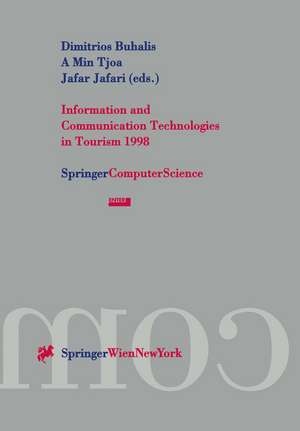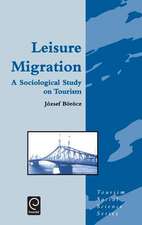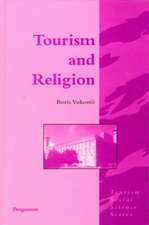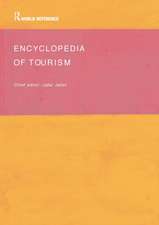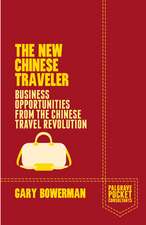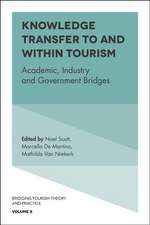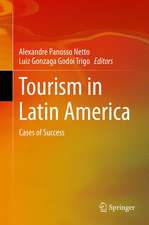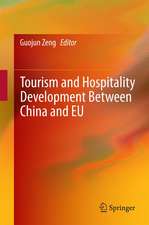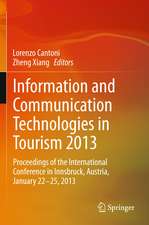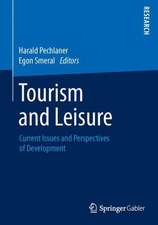Information and Communication Technologies in Tourism 1998: Proceedings of the International Conference in Istanbul, Turkey, 1998
Editat de Dimitrios Buhalis, A Min Tjoa, Jafar Jafarien Limba Engleză Paperback – 7 ian 1998
Preț: 338.35 lei
Preț vechi: 422.94 lei
-20% Nou
Puncte Express: 508
Preț estimativ în valută:
64.76€ • 70.37$ • 54.44£
64.76€ • 70.37$ • 54.44£
Carte tipărită la comandă
Livrare economică 21 aprilie-05 mai
Preluare comenzi: 021 569.72.76
Specificații
ISBN-13: 9783211830888
ISBN-10: 321183088X
Pagini: 364
Ilustrații: XII, 344 p. 39 illus.
Dimensiuni: 170 x 244 x 19 mm
Greutate: 0.58 kg
Ediția:Softcover reprint of the original 1st ed. 1998
Editura: SPRINGER VIENNA
Colecția Springer
Locul publicării:Vienna, Austria
ISBN-10: 321183088X
Pagini: 364
Ilustrații: XII, 344 p. 39 illus.
Dimensiuni: 170 x 244 x 19 mm
Greutate: 0.58 kg
Ediția:Softcover reprint of the original 1st ed. 1998
Editura: SPRINGER VIENNA
Colecția Springer
Locul publicării:Vienna, Austria
Public țintă
ResearchDescriere
Information and Telecommunication Technologies increasingly propel the tourism industry and have become one of the most important determinants of the competitiveness for both the public and the private sectors. It is quite evident that tourism organisations which fail to take advantage of the emergent opportunities introduced by technology will lose considerable market share and suffer strategic disadvantages. Business processes re-engineering is essential therefore throughout the tourism industry. Encouragingly tourism organisations respond to the challenges and a large number of principals use technology in both operational and strategic functions. However, technology threatens traditional distribution channels with disintermediation. Non-tourism organisations also take advantage of the technological developments and launch services for tourism consumers and suppliers, increasing the competition for traditional operators. The tourism industry, therefore, emerges as a very dynamic one and prospects are really exciting for professionals and researchers. Ultimately virtual enterprises will dominate the tourism industry. They will produce cost-effective, instantaneous, mass-customised goods and services; develop dynamic interfaces with suppliers and consumers; and constantly reform their structures in order to satisfy consumer needs. They will also take advantage of lean and flexible organisational frameworks; advanced technology; interactive and innovative marketing and management; rapid reaction to market requests; as well as effective networking and partnerships in order to provide more benefits for all stakeholders. ENTER adopted a consistent scientific approach to the study of tourism and technology. Over the last five years it brought together practitioners and researchers of both tourism and information technology.
Cuprins
1. Dynamic Marketing Applications Using IT.- ITIMES: a knowledge-based system for the tourism industry.- The use of smart-card technology to develop a destination-based loyalty/affinity scheme for SMEs in tourism and hospitality.- Using Information Technology to access overseas markets.- Measuring tourism managers’ information needs by tracking and analyzing the TourMIS Web site statistics.- 2. Designing Information Systems.- Complex intelligent systems: case study of intelligent tourist agency.- Data access to heterogenous tourism information systems.- Concept of an online regional tourism consulting system.- A modular approach to support GIS functionality in tourism applications.- Designing effective documents for destination information systems.- 3. Using the Internet.- The role of an information concept in relation to destination management.- Assessing the market effectiveness of the World-Wide Web in national tourism offices.- Extranets of national tourism organisations: the internet and planned extranet Web-site of the Danish Tourist Board — compared with existing or planned extranets of Australia, Austria and Norway..- An analysis of the WWW as a direct-response marketing vehicle for small, independent, serviced accommodation in greater Cape Town.- 4. Transformation of the Travel Industry.- Separating the emotion from the fact: the effect of new intermediaries on electronic travel distribution.- Desktop: how culture in an international multi-locational travel organisation affects technology decisions in business process re-engineering.- 5. Re-engineering Management Approaches.- A case study of an on-line auction for the World-Wide Web.- The use of data warehouses and as a basis for strategic decision in tourism.- Agent-based cybermarketing in the tourism industry.- More lessons on business process re-engineering from the tourism and hospitality industries: the case of Alpha flight services.- 6. Enhancing Tourism Intermediaries.- The Imminus travel and tourism intranet.- The electronic management of business travel: an integrated approach.- The dissemination of information by means of travel agency extranets.- A Delphi survey on electronic distribution channels for intermediaries in the tourism industry: the situation in German-speaking countries.- 7. New Horizons for Destination Management Systems.- Creating intelligent destinations for wired customers.- A national destination management system (DMS) based on the examples of Germany and Switzerland.- A comparative examination of the implementation of destination-marketing system strategies: Scotland and Ireland.- Online booking on the net: problems, issues and solutions.- 8. Strategic Management in Tourism.- Virtual enterprises in tourism: folklore and facts: Conceptual challenges for academic research.- Information technologies in tourism: implications for the tourism curriculum.- Knowledge management as a full-grown discipline: a framework for a universal approach to knowledge management.- 9. New IT Uses in Tourism.- Electronic payment and additional utilisation of smart cards in the tourism industry.- Computer-based information technologies and their impact on the marketing of international tourism industry.- An overview of the evolution of electronic distribution of travel and tourism in Australia.- The role of handicraft production and art in tourism and its presentation in the internet.
Recenzii
"... The value of this volume lies in the diversity of the individual papers, and in the quality of most of them ... The major markets are probably in academia and education. The case studies in the book make it a good addition to texts for educators to use in the graduate classroom. Practitioners will also find valuable information in some papers to assist them in system development. The international nature of the papers and in particular the case studies is an important contribution ...” Information Technology & Tourism 1/99
Caracteristici
latest developments in information technology in tourism
